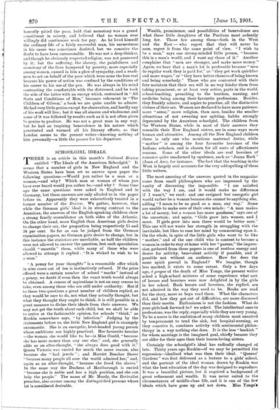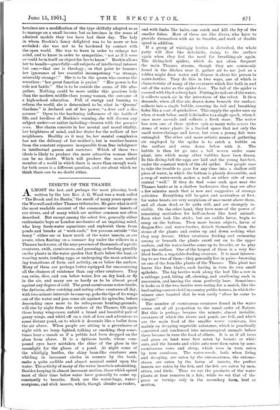SCHOOLGIRL IDEALS.
THERE is an article in this month's National Review entitled " The Ideals of the American Schoolgirl." It seems that a number of girls in New England and the Western States have been set to answer upon paper the following questions :—Would you rather be a man or a woman,—and why? Which man or woman of whom you have ever heard would you rather be,—and why ? Some time ago the same questions were asked in England and in Germany, but theseanswers are only alluded to in the paper before us. Apparently they were exhaustively treated in a former number of the Review. We gather, however, that while the German girls' ideal is in strong contrast to the American, the answers of the English-speaking children show a strong family resemblance on both sides of the Atlantic. On the other hand, more English than American girls desire to change their sex, the proportion being respectively 15 and 34 per cent. So far as can be judged from the German examination-papers, no German girls desire to change, but in this instance the statistics are unreliable, as half the children were not allowed to answer the question, lest such speculation should "unsettle" them, while many of those who were allowed to attempt it replied ," It is wicked to wish to be a man."
"A penny for your thoughts" is a reasonable offer which in nine eases out of ten is instinctively refused. If the prize offered were a certain number of school "marks" instead of a penny, we doubt if even then the exact truth would always be obtained. A census of aspirations is not an easy census to take, even among those who are still under authority: But if to these two questions a great number of children replied, as they would be sure to do,.not what they actually thought, but what they thought they ought to think, it is still possible in a great measure to divine their ideals from their answers. We may not get the truth about each child, but we shall be able to arrive at the fashionable opinion, for schools "think," as Ruskin somewhere says, " by infection." Judging by the statements before us, the little New England girl is strangely unromantic. She is an energetic, level-headed young person whose ambitions are highly practical. Her favourite heroine —the woman she would like to be—is Miss Gould, " because she has more money than any one else," and, she generally adds as an after-thought. " she always does good with it." Queen Victoria was envied for much the same reason, also because she " had jewels " ; and Harriet Beecher Stowe " because many people all over the world admired her," and, again as an after-thought, " because she freed the slaves." In the same way the Duchess of Marlborough is envied " because she is noble. and has a high position, and she can help the people." The name of Mr. Moody, the Revivalist preacher, also occurs among the distinguished persons whose lot is considered desirable.
Wealth, prominence, and possibilities of benevolence are what these little daughters of the Puritans most ardently long for. Those few among them—both in the West and the East who regret that they will never be men, regret it from the same point of view. " I wish to be a man," says one strong-minded little person, " because this is a man's world, and I want my share of it." Another complains that "men are stronger, and make more money." Again, we hear that a man's lot is preferable because " men do regular work they is paid for," or " they get work quicklier and more wages," or " they have better chances of being known and being somebody." Those who are contented with their fate maintain that their sex will in no way hinder them from taking prominent, or at least very active, parts in the world, school-teaching, preaching to the heathen, nursing, and medicine being among their favourite professions. Besides. they frankly admire, and aspire to practise, all the distinctive virtues of their sex. Women are declared to have more patience. more " sense," more religion, than men, besides the smaller attractions of not swearing nor spitting, habits strongly deprecated by the American schoolgirl. The children from the Western States, while in most of their answers they resemble their New England sisters, are in some ways more human and attractive. Among all the New England children there is only one who mentions maternal duties, while " mother " is among the four favourite heroines of the Indiana scholars, and is chosen for all sorts of affectionate reasons. Some of the other ideals are • real heroines of romance quite unadorned by opulence, such as "Joana Bark" (Joan of Arc), for instance. The fact that the teaching in the West is largely oral accounts for the very odd spelling of these little writers.
The most amusing of the answers quoted in the magazine come from small philosophers who are impressed by the vanity of discussing the impossible. " I am satisfied with the way I am, and it would make no difference if I wasn't," we read; and one resigned but energetic girl would rather be a woman because she cannot be anything else, adding " I mean to be as good as a man, any way." Some are unable to make sure of their own minds : " A man makes a lot of money, but a woman has more goodness," says one of the uncertain; and again, " Girls grow into women, and I must. If girls grew into men there would be better men." This one will not waste her strength in struggling with the inevitable, but likes to ease her mind by commenting upon it. On the whole, in spite of the little girls who want to be like
mother," and of the one child who is content to become a woman in order to stay at home with her " parens," the impres- sion gathered from these papers is one of restless energy and desire for activity, benevolent activity if possible, and if possible not without an audience. How far does the same spirit prevail in England ? We imagine, though less marked, it exists to some extent. Only a few days ago, apropos-of the death of Miss Yonge, the present writer asked a high-school mistress of some 'experience what sort of heroes and heroines were now delighted in by the girls in her school. Book heroes and heroines, she replied, are not admired in the way they used to be. Books are read for the story, more as boys read them. What the characters did, and how they got out of difficulties, are more discussed than their merits. Enthusiasm is not the fashion. What do your girls look forward to ? we asked. The intellectual ones to professions, was the reply, especially while they are very young. To be a nurse is the ambition of many children most unsuited by temperament to tend the sick, but hospital-nursing. as they conceive it, combines activity with sentimental philan- thropy in a way nothing else does. It is the less "bookish " for whom marriage is the imagined goal, chiefly because they are older for their ages than their lesson-loving sisters.
Certainly the schoolgirl's ideal has radically changed of late. Thirty years ago Ruskin—if we may be permitted the expression—idealised what was then their ideal. ".Queens Gardens" was first delivered as a lecture to a girls' school, and the portrait of the ideal woman drawn by Ruskin was what the best education of the day was designed to reproduce. It was a beautiful picture, but it required a background of great refinement and wealth. It was never suited to the circumstances of middle-class life, and it is one of the few ideals which have gone up and not down. Miss Yeage's
heroines are a modification of the type skilfully adapted so as to manage on a small income, but as heroines in the sense of admired models they too have had their day. The lady in whom Ruskin's fancy delighted was to be more or less secluded: she was not to be hardened by contact with the open world. She was to learn in order to enlarge her mind, and to know in order to sympathise, " not as if it were or could be in itself an object for her to know." Ruskin allows her to handle—gracefully—all subjects of intellectual interest but one,—that one is theology ; on that point he laments her ignorance of her essential incompetency "as strange, miserably strange !" She is to be the queen who crowns the wrestlers : " her great function it praise." " Her power is for rule not battle." She is to be outside the arena of life alto- gether. Nothing could be more unlike this gracious lady than the modern middle-class young woman, the outcome of a high-school education. Full of energy and burning to reform the world, she is determined to be, what in " Queens' Gardens" is declared out of her power, "a doer and a dis- coverer." Open to the hardening influences of the battle of life, and heedless of Ruskin's warning, she will discuss any subject under—or rather including—heaven with the premier 'emu. Her charm consists in her mental and moral vitality, her brightness of mind, and her desire for the welfare of her neighbours. Healthy as it may be, her mental complexion has not the delicacy of her mother's, but is weather-beaten from the constant exposure inseparable from free indulgence in intellectual games and exercises. Which of these two ideals is likely to produce the more attractive woman there can be no doubt. Which will produce the more useful member of a world in which there is more than enough work for both sexes is a different question, and one about which we think there can be no doubt either.











































 Previous page
Previous page